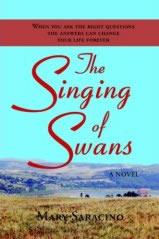The Singing of Swans

Individualism. Capitalism. Survival. Of the fittest. These are values in our society that have evolved from the ideals taught in our mythologies. Historically, these mythologies have been male dominated and, in many cases, have been interpreted in ways designed to oppress certain groups - among them, women. Mary Saracino’s novel The Singing of Swans is a female-centered mythology focusing on the feminine divine, the Divine Mother.
The story revolves around Madalene Ross, a woman in contemporary society whose connections to those around her are tenuous at best. She lost her mother when she was a child, she has a poor relationship with her father and most of her friendships are work related. She discovers her spiritual connection to the past through dreams and an encounter with a homeless woman. Madalene is one in an ancient line of women: the Streghe, women with deep spiritual connections to the Divine Mother, who have been silenced by male dominated social structures, particularly the Catholic Church.
Saracino’s mythology gives a voice to women while also providing social commentary about oppressive forces throughout history. Woven through Madalene’s story are the stories of other Streghe: Ziza, Rosalina, Josephina, Ibla, and Magda, and their struggles to maintain their voice and their connections to the Divine Mother. Using the physical connection of blood ties – to our ancestors and Mother Earth – as well as spiritual ties, Saracino illustrates our sacred connection to the divine in nature and each other, woven as thread through a tapestry, to the past and the future.
While I occasionally enjoy a fun story in a nice, neat package, I truly appreciate those stories that leave me asking questions and searching within myself. How am I connected to all that has happened in the past and all that will happen in the future? We are not islands unto ourselves and Saracino shows our connections – how our pasts have shaped our world today and how we shape the future.